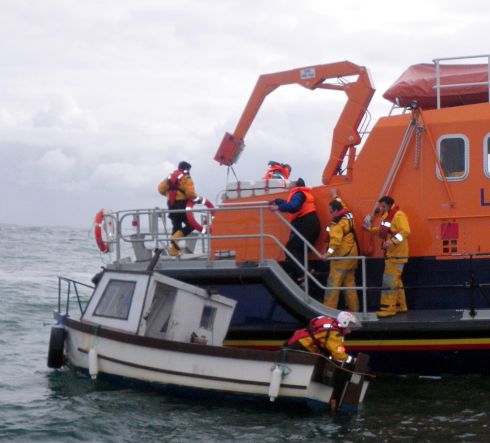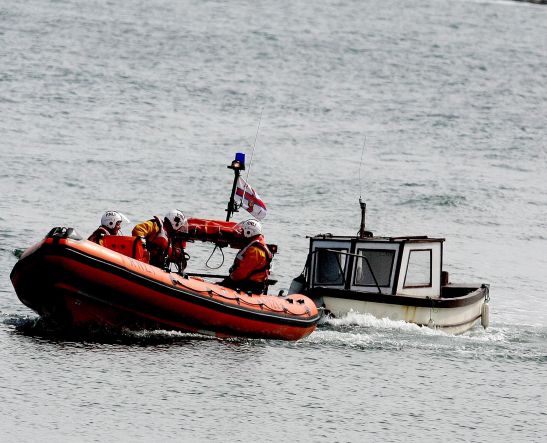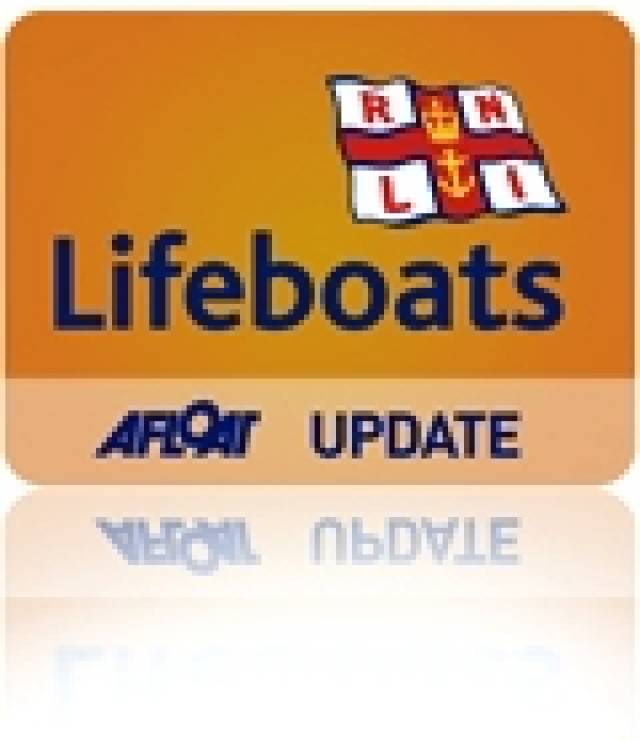On a busy Sunday for RNLI lifeboat crews off the north Antrim Coast both Red Bay and Portrush RNLI lifeboat crews launched at 9.22am this morning to reports of a vessel in difficulty with two people onboard off Sheep Island at Ballintoy.
The 16 foot fishing boat got into difficulties when an anchor went down and a crewmember from the vessel bent over the bow of the boat in an attempt to retrieve it. He was caught by a wave and pulled into the freezing water.
When the lifeboats arrived on scene the man had been recovered onto the vessel by the other crewmember. Conditions were poor with a force five in evidence and a big swell. Both men were suffering from the cold and were in shock. The vessel was clearly in great difficulty and the two men were transferred onboard the Portrush all weather lifeboat while Red Bay RNLI towed the vessel back to land. A waiting ambulance met the casualties at Ballycastle.

Commenting on the rescue Red Bay RNLI helm Paddy McLaughlin said, “These two men were extremely lucky today. One man had already entered the freezing water before getting back on the boat and they were both in need of medical assistance by the time we had reached them.”
The rescue operation lasted for three hours and was the second major rescue for the RNLI in the area that morning. Portrush RNLI inshore lifeboat crew rescued two men from the sea while their all weather lifeboat assisted Red Bay with the Ballintoy callout.

Additional report from MCA:
The emergency 999 call was made at 9.15 this morning alerting the marine emergency service and that the cruiser with two people on board was in extreme difficulty and without power.
The Coastguard immediately relayed a mayday signal into the area to alert other vessels to the on going emergency.
The Portrush and Redbay lifeboats were also asked to launch and a rescue helicopter was initially scrambled from the Royal Naval Air Station at Prestwick, however by this time the man had been recovered to the vessel and it was stood down. His colleagues on board the cabin cruiser indicated that he was very cold but there were no visible injuries and that he was slowly warming up, but they remained without power as a rope had been caught around its propeller and were experiencing very heavy weather. The Portrush all weather lifeboat picked up the man who gone into the water and a colleague and brought them will all speed back to Ballycastle. The Redbay lifeboat is now bringing the vessel under tow back to Ballycastle.
Meanwhile a further call was taken from Portrush promenade where a member of the public had spotted two people in the water shouting for help. Both were drunk and had been caught in the rip tide off West Strand. The Coastguard began broadcasting into the area immediately requesting vessels to go to his assistance and the Portrush inshore lifeboat was on scene very quickly and recovered both people to the lifeboat. An ambulance was requested and the lifeboat was met by the Coleraine Coastguard Rescue Team and paramedics.
Alan Pritchard, Duty Watch Manager at Belfast Coastguard said:
“It is clear that the weather is going to be somewhat rough today with rain forecast. We are asking the boating public and those who will be visiting the coastline to take that extra bit of care. Make sure you have some communication with you, and of course if you go afloat wear a lifejacket! The two men who went into the water whilst under the influence of drink are very poorly in hospital, and we cannot stress enough how dangerous it is going into the sea whilst drinking.”































































